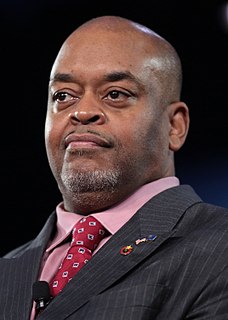A Quote by Darryl Pinckney
In the years after World War I, blacks began to migrate to the North and its imagined freedoms in great numbers - 'Russian' came to mean a black who had rushed from the South.
Related Quotes
You take a look at the history of African Americans in the US. There's been about thirty years of relative freedom. There was a decade after the Civil War and before north/south compact essentially recriminalized black life. During the Second World War there was a need for free labor so there was a freeing up of the labor force. Blacks benefitted from it.
In contrast, Western historians, and those in South Korea, say the North attacked the South on June 25, 1950. Both sides agree that after the war began, the North Korean Army captured Seoul in three days and pushed as far south as Pusan before American troops arrived to drive back the North Koreans nearly as far north as the border to China.
When I came to Detroit, if you threw a stone up in the air it would hit an autoworker on its way down. A few years after that, if you threw a stone in the air it'd hit an abandoned house or a vacant lot on its way down. And most people saw those vacant lots as blight. But meanwhile during World War II, blacks had moved from the South to the North. And they saw these vacant lots as places where you could grow food for the community. And so urban agriculture was born.
At the beginning of the 20th century, before the migration began, 90 percent of all African-Americans were living in the South. By the end of the Great Migration, nearly half of them were living outside the South in the great cities of the North and West. So when this migration began, you had a really small number of people who were living in the North and they were surviving as porters or domestics or preachers - some had risen to levels of professional jobs - but they were, in some ways, protected because they were so small.
We have heard all of our lives how, after the Civil War was over, the South went back to straighten itself out and make a living again. It was for many years a voiceless part of the government. The balance of power moved away from it--to the north and the east. The problems of the north and the east became the big problem of the country and nobody paid much attention to the economic unbalance the South had left as its only choice.
Southern Kordofan is not a disputed territory. It is, and will remain, in the north, where the Nuba Mountains are. People believe there was a genocide there in 1990s. The Nuba, who are northerners, fought with the south in the north-south war. But they have their own individual interests, and they will remain in the north after the south splits.
Most of us who were opposed to the war, especially in the early '60's - the war we were opposed to was the war on South Vietnam which destroyed South Vietnam's rural society. The South was devastated. But now anyone who opposed this atrocity is regarded as having defended North Vietnam. And that's part of the effort to present the war as if it were a war between South Vietnam and North Vietnam with the United States helping the South. Of course it's fabrication. But it's "official truth" now.
Blacks were not enslaved because they were black but because they were available. Slavery has existed in the world for thousands of years. Whites enslaved other whites in Europe for centuries before the first black was brought to the Western hemisphere. Asians enslaved Europeans. Asians enslaved other Asians. Africans enslaved other Africans, and indeed even today in North Africa, blacks continue to enslave blacks.
Order was only restored in L.A. when it came time for the blacks to pick up their welfare checks three days after rioting began. ... What if the checks had never arrived? No doubt the blacks would have fully privatized the welfare state through continued looting. But they were paid off and the violence subsided.
The first election in which all South Africans took part was in April, 1994. There were long queues [lines] of employers and employees, black and white. In the sense of Africans, Coloreds and Indians - when I talk about blacks, I mean those three. Blacks and whites mingled to vote without any hitches. Many people would have expected a great deal of tension, clashes and violence, but it did not occur.
Long before there was discrimination against blacks, there was discrimination against white southerners. When large numbers of these country people moved north during World War II, they were aggressively excluded from neighborhoods, jobs, and homes - not because of their skin color, but their accents.
They do not know what they say. If it came to a conflict of arms, the war will last at least four years. Northern politicians will not appreciate the determination and pluck of the South, and Southern politicians do not appreciate the numbers, resources, and patient perseverance of the North. Both sides forget that we are all Americans. I foresee that our country will pass through a terrible ordeal, a necessary expiation, perhaps, for our national sins.






































